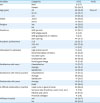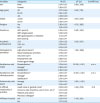1. Casey T, Wilson-Evered E. Predicting uptake of technology innovations in online family dispute resolution services: an application and extension of the UTAUT. Computers in Human Behavior. 2012; 28(6):2034–2045.

2. Kang YH, Hong MJ. Influencing factors of learning style, critical thinking disposition on clinical performance competency of nursing students. Journal of the Korean Data Analysis Society. 2014; 16(5):2841–2853.
3. Lim YJ. The impact of nursing students' emotional labor and clinical practice stress on burnout. Journal of Learner-Centered Curriculum and Instruction. 2017; 17(6):461–474.

4. Fang DZ, Young CB, Golshan S, Moutier C, Zisook S. Burnout in premedical undergraduate students. Academic Psychiatry. 2012; 36(1):11–16.


5. Cho HH, Kang JM. Factors influencing clinical practice burnout in student nurses. Child Health Nursing Research. 2017; 23(2):199–206.

6. Cho HH, Kang JM. Effect of resilience, coping, and mental health on burnout of student nurses. Child Health Nursing Research. 2018; 24(2):199–207.

7. Anderson LM, Pearson CM. Tit for tat? The spiraling effect of incivility in the workplace. Academy of Management Review. 1999; 24(3):452–471.
8. Kim SL, Lee JE. Relationship among stress, coping strategies, and self-esteem in nursing students taking clinical experience. Journal of Korean Academic Society of Nursing Education. 2005; 11(1):98–106.
9. Hong Y, Kim Y, Son H. Effect of nurses' incivility experienced by nursing student, coping on burnout in clinical practice. Journal of Korean Academy of Nursing Administration. 2016; 29(4):323–331.

10. Por J, Barriball L, Fitzpatrick J, Roberts J. Emotional intelligence: its relationship to stress, coping, well-being and professional performance in nursing students. Nurse Education Today. 2011; 31(8):855–860.


11. Seo JH. Effects of nursing image, satisfaction in major, ego-resilience on nursing professionalism of nursing students [master's thesis]. Chungnam: Kongju National University;2018. 49.
12. Hong HH, Kong JH, Kang HS, Jeong HS, Yang SK. The study on the professional self -concept, ego-resilience, clinical competence of nursing students. Journal of Korean Clinical Health Science. 2014; 2(2):98–106.
13. Cohen S, Hoberman HM. Positive events and social supports as buffers of life change stress. Journal of Applied Social Psychology. 1983; 13(2):99–125.
14. Kim BK. Factors related to interpersonal relationship stress in clinical practice among nursing students [master's thesis]. Seoul: Yonsei University;2017. 87.
15. Kang SY. Impact of nursing students' emotional labor on burnout during nursing practice in a hospital: moderating effect of emotional intelligence. Journal of Korean Academy of Nursing Administration. 2015; 21(1):77–87.

16. Anthony M, Yastik J, MacDonald DA, Marshall KA. Development and validation of a tool to measure incivility in clinical nursing education. Journal of Professional Nursing. 2014; 30(1):48–55.


17. Yang YH, Kim EM, Yu M, Park SM, Lee HY. Development of the resilience scale for korean nursing college students. Korean Journal of Adult Nursing. 2015; 27(3):337–346.

18. Park JW. A study to development a scale of social support [dissertation]. Seoul: Yonsei University;1985. 127.
19. Woo JA. Emotional responses, coping and social support for verbal abuse, sexual harassment, physical threats experienced by nursing students in clinical training [dissertation]. Pusan: Pusan National University; 2017;2017. 153.
20. Schaufeli WB, Martinez IM, Pinto AM, Salanova M, Bakker AB. Burnout and engagement in university students: a cross-national study. Journal of Cross-Cultural Psychology. 2002; 33(5):464–481.
21. Lee J, Puig A, Kim YB, Shin HJ, Lee JH, Lee SM. Academic burnout profiles in Korean adolescents. Stress and Health. 2010; 26(5):404–416.

22. Kim JG, Yoo JH, Cheon EY. Realtionship among incivility, burnout, coping and satisfaction to clinical practice experienced by nursing college students in clinical practice. Journal of the Korea Academia-Industrial Cooperation Society. 2017; 18(1):316–324.
23. Park JW, Ha NS. Nursing student's clinical experience. Journal of Korean Academy of Psychiatric and Mental Health Nursing. 2003; 12(1):27–35.
24. Lee YE, Jang YN. Effects of exposure to violence during clinical practicum, self-esteem and resilience on depression among nursing students. Journal of the Korea Contents Association. 2018; 18(8):646–657.
25. Lee YE, Kim EY, Park SY. Effect of self-esteem, emotional intelligence and psychological well-being on resilience in nursing students. Child Health Nursing Research. 2017; 23(3):385–393.

26. Korean Accreditation Board of Nursing Education. A report on evaluation of nursing school, 2016. Seoul: Korean Accreditation Board of Nursing Education;2017.
27. Löfmark A, Wikblad K. Facilitating and obstructing factors for development of learning in clinical practice: a student perspective. Journal of Advanced Nursing. 2001; 34(1):43–50.

28. Jeon SY. The relationship between social support, health status, college adjustment and academic achievement in college students. Journal of Korean Society for School & Community Health Education. 2010; 11(1):99–115.
29. Noh YG. Influence of social support on the relationship between practice stress, emotional labor and burnout among nursing students. Journal of Korean Academy of Nursing Administration. 2017; 23(5):461–470.










 PDF
PDF ePub
ePub Citation
Citation Print
Print



 XML Download
XML Download